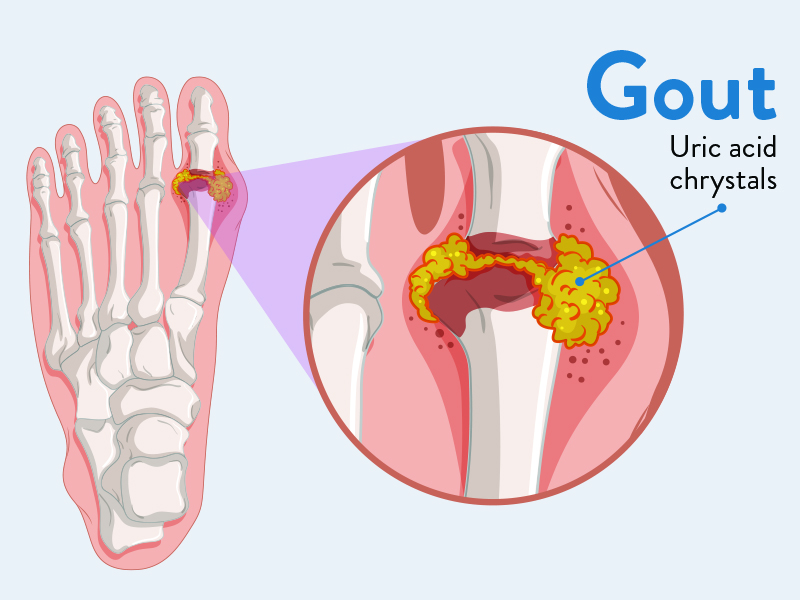Introduction
Are you searching for the best gout doctor near you? Gout is a painful and often debilitating condition that requires specialized care. This guide will help you understand what gout is, why you need a specialist, and how to find the best gout doctor in your area.
What is Gout?
Gout is a type of arthritis caused by the accumulation of uric acid crystals in the joints. This build-up leads to sudden and severe pain, swelling, and redness, often in the big toe but it can affect other joints as well. Imagine trying to walk on a foot that feels like it’s been set on fire—this is what a gout flare-up can feel like.
Why You Need a Gout Specialist
While your primary care physician can help diagnose gout, a specialist, such as a rheumatologist, has advanced training in diagnosing and treating arthritis and other musculoskeletal diseases. They can offer more targeted and effective treatments, tailored to your specific needs.
Symptoms of Gout
The symptoms of gout can be sudden and intense. They often include:
- Severe joint pain: Typically in the big toe, but also in feet, ankles, knees, hands, and wrists.
- Lingering discomfort: Even after the severe pain subsides, you might experience joint discomfort for a few days to a few weeks.
- Inflammation and redness: The affected joint or joints become swollen, tender, warm, and red.
- Limited range of motion: As gout progresses, you might not be able to move your joints normally.
Diagnosing Gout
Diagnosing gout usually involves a combination of methods:
- Medical history and physical examination: Your doctor will ask about your symptoms and examine the affected joints.
- Blood tests: These tests measure the level of uric acid in your blood.
- Joint fluid test: This test involves drawing fluid from the affected joint to look for uric acid crystals.
- X-rays: To rule out other causes of joint inflammation.
Treatment Options for Gout
Treatment for gout aims to relieve symptoms and prevent future attacks. The main treatments include:
- Medications: To reduce pain and inflammation during an acute attack, and to lower uric acid levels to prevent future attacks.
- Lifestyle changes: Such as diet and exercise to help manage gout.
- Home remedies: Like applying ice to the affected area and staying hydrated.
Finding a Gout Doctor Near You
When searching for a gout doctor near me, consider the following steps:
- Ask for referrals: Your primary care doctor can recommend a specialist.
- Research online: Use websites that specialize in doctor ratings and reviews.
- Check credentials: Ensure the doctor is board-certified and has experience treating gout.
- Consider logistics: Look for a doctor whose office is conveniently located and has office hours that fit your schedule.
Questions to Ask Your Gout Doctor
When you meet with your gout doctor, consider asking these questions:
- What are my treatment options?
- How can I prevent future gout attacks?
- Are there any lifestyle changes I should make?
- What side effects might my medications have?
- How often should I schedule follow-up appointments?
The Role of Lifestyle Changes in Managing Gout
Lifestyle changes can play a significant role in managing gout. These changes include:
- Diet: Avoid foods high in purines (like red meat and seafood), limit alcohol intake, and drink plenty of water.
- Exercise: Maintain a healthy weight through regular physical activity.
- Avoiding triggers: Identify and avoid things that trigger your gout attacks.
Medications Commonly Prescribed for Gout
Common medications for gout include:
- NSAIDs: Nonsteroidal anti-inflammatory drugs to relieve pain and inflammation.
- Colchicine: Helps reduce gout pain, especially when taken early in an attack.
- Corticosteroids: Reduce inflammation and pain.
- Uric acid-lowering medications: Such as allopurinol and febuxostat, to prevent future attacks.
Preventing Gout Flare-Ups
Preventing gout flare-ups involves:
- Staying hydrated: Drink plenty of water.
- Managing your diet: Avoid high-purine foods and limit alcohol.
- Maintaining a healthy weight: Excess weight increases uric acid levels.
- Taking prescribed medications: Follow your doctor’s instructions for any medications you are prescribed.
Living with Gout: Tips and Advice
Living with gout can be challenging, but these tips can help:
- Stay informed: Educate yourself about gout and its treatments.
- Keep track of your symptoms: Maintain a diary of your symptoms and triggers.
- Follow your treatment plan: Adhere to the medications and lifestyle changes recommended by your doctor.
- Seek support: Connect with others who have gout through support groups or online forums.
Frequently Asked Questions
1. What foods should I avoid if I have gout?
Avoid foods high in purines, such as red meat, seafood, and organ meats. Also, limit alcohol, especially beer, and sugary drinks.
2. Can gout be cured?
While there is no cure for gout, it can be effectively managed with medication and lifestyle changes.
3. How long do gout attacks last?
Gout attacks can last from a few days to a few weeks, depending on the severity and treatment.
4. Can stress trigger a gout attack?
Yes, stress can be a trigger for gout attacks. Managing stress through relaxation techniques can help reduce the risk.
5. Is gout hereditary?
Gout can run in families, so if you have a family history of gout, you may be at higher risk.
Conclusion
Finding the right gout doctor near me is crucial for effective treatment and management of this painful condition. By understanding gout, recognizing its symptoms, and knowing your treatment options, you can take proactive steps towards better health. Remember to ask the right questions, make necessary lifestyle changes, and follow your doctor’s advice to manage gout successfully.









